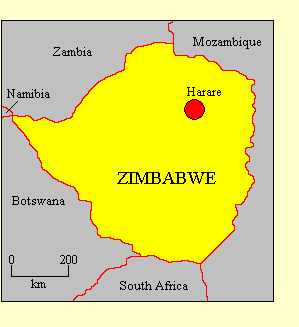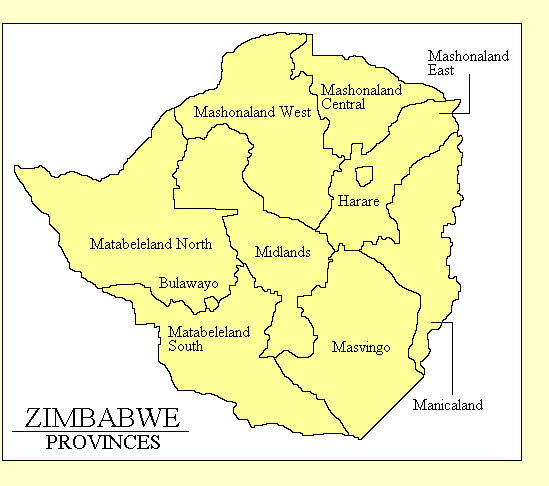

REPUBLIC OF ZIMBABWE
• Official name: Republic of Zimbabwe
• Location: Southern Africa
• International organisations: African, Caribbean and Pacific Group of States, African Union,
Commonwealth of Nations, Non-Aligned Movement, United Nations, World Trade Organisation
(Zimbabwe's membership of the Commonwealth of Nations is currently suspended)
• Borders: Botswana, Mozambique, South Africa, Zambia
• Coastline: None
• Land area: 390,580 Km2
• Population: 12,500,000
• Annual GDP (PPP) per capita: US$100 (2009 CIA estimate). World ranking: 194. On this ranking Zimbabwe
is the poorest country in the world.
• Ethnicity: The dominant ethnic group are the Shona (82% of the population). The other
major group is the Ndebele (14%). There are small minorities of Europeans and Indians.
• Languages: English is the official language and is the language of government and
business. The most important African languages are Shona and Sindebele.
• Religion: The majority of the population follow a mixture of Christian and
indigenous religions. About 25% are Christians.
• Form of government: In form, a presidential democratic republic. In practice, very
close to be being a dictatorship. Zimbabwe is divided into eight provinces and two cities.
• Capital: Harare
• Constitution: The Constitution of the Republic of Zimbabwe came
into effect on 21 December 1979. It has been substantially amended since.

• Head of state: The President, elected by direct universal suffrage for a six-year term.
• Head of government: The Prime Minister, appointed by the President. The position of Prime Minister was created in 2009
to resolve the deadlock arising from the 2008 presidential election.
• Legislature: Zimbabwe has a bicameral legislature, the
Parliament. The House of Assembly has 150 members elected for five-year terms
from single-member constituencies. The Senate has 66 members, of whom 50 members are elected from single-member
constituencies, with each province elcting five members. The President appoints six members. Ten members represent
traditional chiefs.
• Electoral authority: The Zimbabwe Electoral Commission administers national elections.
• Freedom House 2009 rating: Political Rights 7, Civil Liberties 6
Political history
The territory which is now Zimbabwe was acquired by the British South Africa Company
in 1895 following the defeat of the Matabele kingdom's army by the company's forces, and was
named Rhodesia after the company's founder, Cecil Rhodes. In Southern
Rhodesia a white settler class acquired most of the land, and in 1923 the settlers were
given self-government with an elected legislature. An African nationalist movement
developed after World War II. To counter this, the Federation of Rhodesia and
Nyasaland was formed in 1953, under white leadership.
African resistance led to the breakup of the Federation in 1963, with Zambia (Northern Rhodesia) and
Malawi (Nyasaland) becoming independent. The
white minority in Southern Rhodesia, led by Ian Smith, resisted majority rule, and in 1965 they illegally
declared Rhodesia an independent republic under white minority rule. African
nationalist organisations waged a
sporadic guerilla war against the government until 1979, when the Commonwealth brokered a settlement. Elections
were held in 1980 and Robert Mugabe became Prime Minister of independent
Zimbabwe.

Mugabe's regime became increasingly authoritarian and intolerant of
opposition, particularly since Mugabe altered the constitution and made himself
President with wide powers in 1987. The regime's disastrous socialist economic policies, particularly its
confiscation of white-owned farms, have destroyed the economy and produced widespread
opposition. A new opposition party, the
Movement for Democratic Change, polled strongly
in the 2000 legislative elections and would probably have won them if free campaigning
in rural areas had been possible. Mugabe's re-election as President in 2002 was blatantly
rigged.
The economy deteriorated further after 2002, and at the 2008 presidential election
the MDC leader,
Morgan Tsvangirai, polled
48% to Mugabe's 43% despite widespread intimidation of voters by ZANU-PF militias. Tsvangirai would certainly have
won the second round had not the escalating level of violence caused him to withdraw, allowing Mugabe to be elected
unopposed. But the MDC won control of the House of Assembly, and the resultant deadlock led to a constitutional amendment
creating the post of Prime Minister and the formation of a "national unity" government led by Tsvangirai.
Freedom House's 2009 report on Zimbabwe
says: "Zimbabwe is not an electoral democracy. President Robert Mugabe and the ruling ZANU-PF party have dominated
the political landscape since independence in 1980, overseeing 18 amendments to the constitution that have expanded
presidential power and decreased executive accountability. Presidential and legislative elections in March 2008 were
marred by a wide-ranging and brutal campaign of violence and intimidation, flawed voter registration and balloting,
biased media coverage, and the use of state resources - including food aid - to bribe and threaten voters. The government
failed to implement changes to electoral, security, and press laws that were agreed to in a 2007 constitutional
amendment... Corruption is rampant throughout the country, including at the highest levels of government. The collapse in
public-service delivery and the politicisation of food and agricultural aid has made the problem ubiquitous at the local
level. Anticorruption prosecutions are almost exclusively motivated by political vendettas. Extensive graft and nepotism
have contributed to the stark decline in public and investor confidence in the national economy. Zimbabwe was ranked
166 out of 180 countries surveyed in Transparency International's 2008 Corruption Perceptions Index...
Freedoms of expression and of the press are severely restricted... Despite government commitments to liberalize these laws
ahead of the 2008 elections, only minimal changes were made... The government dominates the print and broadcast media,
which are generally seen as mouthpieces of the regime... While some courts have struck down or disputed government actions,
increasing pressure by the regime has substantially eroded judicial independence."
Updated February 2010
|


